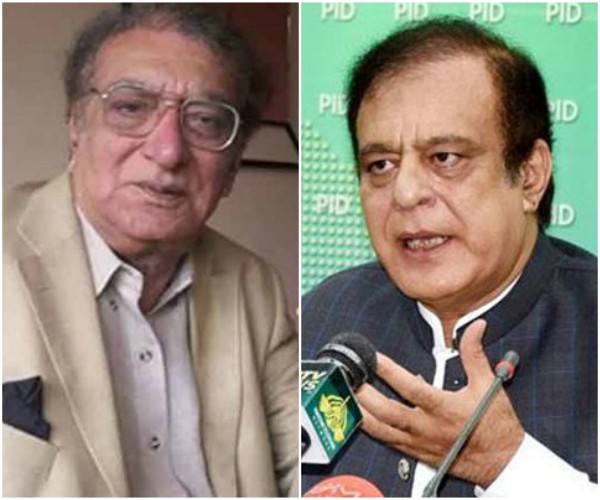Today Faraz’s son speak for a regime that is often described as ‘hybrid’
Pakistan’s information minister is seen more and more on the TV screen nowadays. There he is on nearly every channel, —giving briefings, answering questions and being interviewed, cool and collected, smirking his way through the questions as he talks of PTI’s political opponents and assures journalists that his government is doing amazing things for the country.
It is, of course, commendable that the minister is so accessible to journalists and so happy to dominate screen time, but every time I see him on the box I cannot help but wonder if his father would’ve supported such a regime.
Ahmed Faraz was one of the greatest Urdu poets of the twentieth century. And along with poets like Faiz Ahmed Faiz and Habib Jalib his poetry has also documented the political and social struggles of the the time. One particular poem of Faraz did become very controversial and reportedly there was a period in which he denied that it was his work. The reason is because that particular work (“…Tum Sipahi Nahin”) is extremely critical of martial tyranny and bloodshed and harks back to the attitude of the army during the bloody civil war which resulted in the secession of East Pakistan and the creation of Bangladesh.
That poem is chilling. Read it (or listen to a recital) today and your blood will run cold. Through verse the poet tells of a terrible disillusionment and declares that his pen will not write lies or propaganda as it is not a weapon to be used by tyrants but rather is the instrument of the people, the awam. “Mera Qalam tow amanat hai meray logon ki.” He talks of a military that uses force against its own people, of tyrants who talk of justice but practise cruelty and encourage hatred. The poem harks back not just to the civil war but to numerous political upheavals and regime changes and conflicts — and the words are spine chilling.
Listen to the verses and it is not difficult to see why Faraz was forced to deny the poem and why at one time it was circulated secretly by people. I’m not sure if he ever spoke, on the record, about what the repercussions were for him of writing that poem, but I imagine the consequences could not have been pleasant. And perhaps it was these consequences that convinced his family members that such lofty principles are simply not paying such a high price for.
Today Faraz’s son speak for a regime that is often described as ‘hybrid’ and represents a government that works very closely with the institution whose very attitudes and actions are criticised in this poem. It seems the fact is indeed stranger than fiction. Or perhaps we should just call this ‘progress’.
But listen to this particular poem in the context of present day Pakistan and one thing becomes clear: it doesn’t matter what compromises people like Faraz might make in later life if they are able to leave behind them such creations, creation that lives on long after they are gone and reverberate so strongly still. This is art but it is also social history and a lasting testament to political struggle and the fight for justice, it is the reminder of a dark night and of the people who fight for the dawn of justice and for an end to oppression and division. The poem is also an acknowledgement of the duty of the writer, a reiteration of the poet’s responsibiltity to document and resist tyranny “aaj shayir par yeh qarz matti ka hai” — he says the situation is serious and his words are written not with ink but in blood “aaj is qalam may lahu hai siyahi nahin”.
Today Faraz’s son speak for a regime that is often described as ‘hybrid’ and represents a government that works very closely with the institution whose very attitudes and actions are criticised in this poem. It seems the fact is indeed stranger than fiction. Or perhaps we should just call this ‘progress’.







